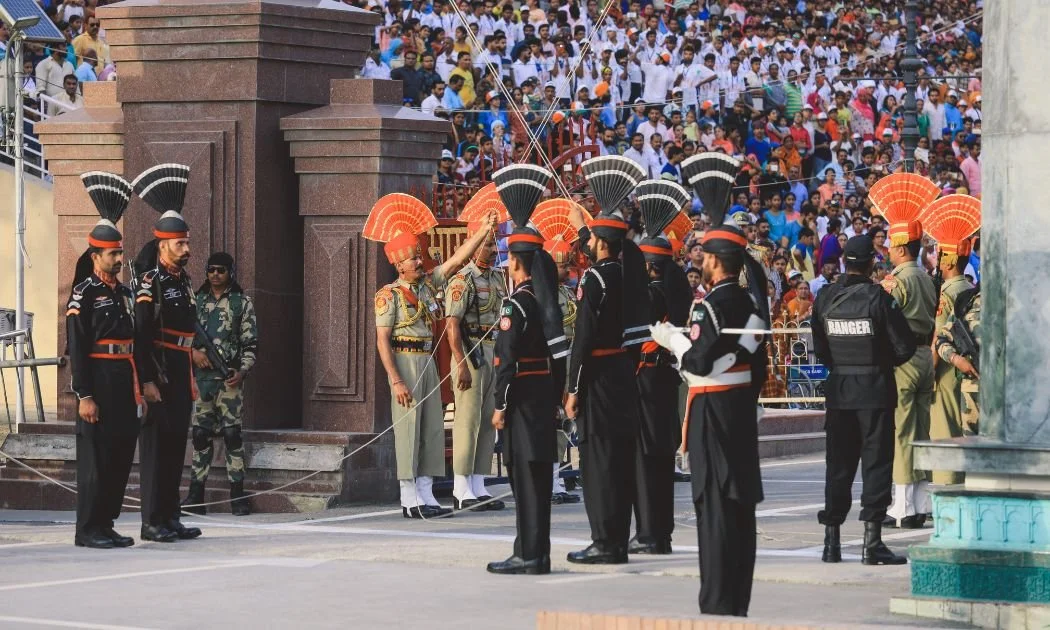UN Urges ‘Maximum Restraint’ amid India-Pakistan Tension after Kashmir Attack
New Delhi Claims ‘Clear Evidence’ of Cross-Border Involvement
April 25, 2025
The Wagah–Attari border crossing between India and Pakistan
Amid tensions between India and Pakistan over the April 22 terror attack near Pahalgam in Jammu and Kashmir, United Nations Secretary-General António Guterres, speaking through his spokesman Stéphane Dujarric, has “appealed to both governments to exercise maximum restraint” and asked them to keep the situation from sliding any further.
The UN framed the appeal against two reference points: its condemnation of the attack itself—26 tourists were shot dead in one of the valley’s worst civilian massacres in decades—and its long-standing view that disputes over Kashmir must be settled peacefully.
While the organisation has no enforcement power over either nuclear-armed state, the message sought to place early diplomatic guard-rails around a fast-moving crisis.
India’s immediate reaction has been forceful, and it sits uneasily beside the UN’s plea.
On the military front, the army chief General Upendra Dwivedi flew to Srinagar for a security review, “search-and-destroy” patrols spread across south Kashmir, surveillance drones were put up and troop numbers were reinforced throughout the valley. Simultaneously, the air force revived its large-scale Gaganshakti drills—featuring Rafale strike squadrons—and the navy test-fired a surface-to-air missile, signalling readiness for a broader contingency, as reported by The Guardian.
Diplomatically, New Delhi has tried to raise the costs for Islamabad.
Foreign Secretary Vikram Misri briefed envoys from 25 countries, including China, laying out what India calls “clear evidence” of cross-border involvement. Within 24 hours, India suspended participation in the 1960 Indus Waters Treaty, shut the Attari–Wagah land crossing, curtailed Pakistani diplomatic staff and cancelled all Pakistani visas except for Sikh pilgrims.
These steps, announced alongside Prime Minister Narendra Modi’s vow to “track and punish every terrorist and their backer,” reflect an effort to treat the assault not as an isolated crime but as an act with strategic authorship, according to Al Jazeera.
Pakistan has adopted a mirror-image posture.
Denying any role in the killings and calling India’s dossier “frivolous,” Islamabad convened its National Security Committee, expelled Indian defence advisers, cut Indian staff at the High Commission, cancelled Indian visas, closed the Wagah crossing from its side and shut its airspace to Indian carriers, according to the Guardian. A government statement warned that any Indian attempt to restrict Indus water flows would be an “act of war,” promising a reply “with full force across the complete spectrum of national power.”
Pakistan has also threatened to freeze the 1972 Simla Agreement, thereby casting doubt on the framework that has guided bilateral contacts for half a century.
Even as diplomats traded expulsions, shots were fired along the Line of Control, started by Pakistan, according to Hindustan Times. Pakistani officials confirmed “post-to-post” overnight exchanges in the Leepa Valley, 95 km east of Muzaffarabad, describing the fire as confined to military positions with no civilian casualties, as reported by DW. Indian sources reported small-arms fire and a “befitting reply.”
Against this backdrop, the UN’s call for restraint seeks to arrest an action–reaction cycle that is gathering momentum. Both capitals have publicly noted the appeal yet have pressed on with their chosen measures: India argues that restraint cannot override its duty to protect citizens and water rights, Pakistan insists that self-defence allows proportionate counter-steps. Each government is therefore interpreting “restraint” through its own security lens, leaving the UN to watch from the sidelines and reiterate that any durable outcome will require “meaningful mutual engagement” rather than unilateral pressure or armed riposte, The Washington Post noted.
For now, the UN remains the only neutral voice calling both to step back. Its influence is limited by the permanent members’ divided interests, yet its message of maximum restraint sets the tone for international engagement. If further violence along the Line of Control or within Kashmir raises the stakes again, the same appeal may form the basis for any emergency shuttle diplomacy aimed at pulling two nuclear neighbours back from a collision that neither claims to want.
You have just read a News Briefing by Newsreel Asia, written to cut through the noise and present a single story for the day that matters to you. Certain briefings, based on media reports, seek to keep readers informed about events across India, others offer a perspective rooted in humanitarian concerns and some provide our own exclusive reporting. We encourage you to read the News Briefing each day. Our objective is to help you become not just an informed citizen, but an engaged and responsible one.

